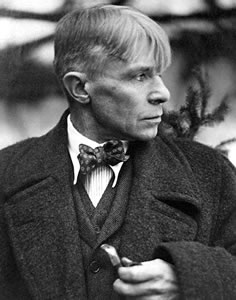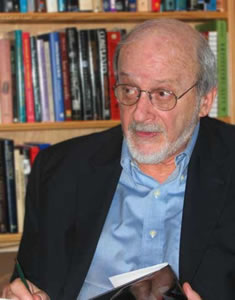De Libanese dichter en romanschrijver Khalil Gibran werd geboren op 6 januari 1883 in Bischarri. Zie ook mijn blog van 6 januari 2007 en ook mijn blog van 6 januari 2008 en ook mijn blog van 6 januari 2009.
Uit: A Poet’s Death is His Life
„The dark wings of night enfolded the city upon which Nature had spread a pure white garment of snow; and men deserted the streets for their houses in search of warmth, while the north wind probed in contemplation of laying waste the gardens. There in the suburb stood an old hut heavily laden with snow and on the verge of falling. In a dark recess of that hovel was a poor bed in which a dying youth was lying, staring at the dim light of his oil lamp, made to flicker by the entering winds. He a man in the spring of life who foresaw fully that the peaceful hour of freeing himself from the clutches of life was fast nearing. He was awaiting Death’s visit gratefully, and upon his pale face appeared the dawn of hope; and on his lops a sorrowful smile; and in his eyes forgiveness.
He was poet perishing from hunger in the city of living rich. He was placed in the earthly world to enliven the heart of man with his beautiful and profound sayings. He as noble soul, sent by the Goddess of Understanding to soothe and make gentle the human spirit. But alas! He gladly bade the cold earth farewell without receiving a smile from its strange occupants.
He was breathing his last and had no one at his bedside save the oil lamp, his only companion, and some parchments upon which he had inscribed his heart’s feeling. As he salvaged the remnants of his withering strength he lifted his hands heavenward; he moved his eyes hopelessly, as if wanting to penetrate the ceiling in order to see the stars from behind the veil clouds.
And he said, “Come, oh beautiful Death; my soul is longing for you. Come close to me and unfasten the irons life, for I am weary of dragging them. Come, oh sweet Death, and deliver me from my neighbors who looked upon me as a stranger because I interpret to them the language of the angels. Hurry, oh peaceful Death, and carry me from these multitudes who left me in the dark corner of oblivion because I do not bleed the weak as they do. Come, oh gentle Death, and enfold me under your white wings, for my fellowmen are not in want of me. Embrace me, oh Death, full of love and mercy; let your lips touch my lips which never tasted a mother’s kiss, not touched a sister’s cheeks, not caresses a sweetheart’s fingertips. Come and take me, by beloved Death.”
Then, at the bedside of the dying poet appeared an angel who possessed a supernatural and divine beauty, holding in her hand a wreath of lilies. She embraced him and closed his eyes so he could see no more, except with the eye of his spirit. She impressed a deep and long and gently withdrawn kiss that left and eternal smile of fulfillment upon his lips. Then the hovel became empty and nothing was lest save parchments and papers which the poet had strewn with bitter futility.“
Khalil Gibran (6 januari 1883– 10 april 1931)
Portret door Yusef Hoyiek, 1908.
De Nederlandse dichteres Hester Knibbe werd geboren op 6 januari 1946 in Harderwijk. Knibbe beheerde als klinisch-farmaceutisch analyste lange tijd het laboratorium van een ziekenhuisapotheek. Zij publiceerde poëzie in onder meer Tirade, Bzzlletin, Raster en Maatstaf. Ze debuteerde in 1982 als dichter met de bundel Tussen gebaren en woorden en publiceerde sindsdien nog zes bundels, waarvan Antidood (1999) bekroond werd met de Herman Gorterprijs. In 2001 ontving zij de Anna Blamanprijs voor haar gehele oeuvre. Voor De buigzaamheid van steen werd haar de Publieksprijs 2005 toegekend.
De achterkant van Rome
De achterkant van Rome is een koker
met harde stemmen, was die hangt te drogen.
Hier klinkt in mei een oude lente
met in de ochtend oud geluid
van duiven, terwijl de nacht blijft kleven
aan de stenen; er grauwt alleen
wat dag doorheen. Vanuit de kamers
is de hemel dicht; pas als je
uit het raam buigt, kiert hij
licht. Beelden van Huisraad,
Golfplaat, Afvoerbuis: een tempel
van god Onooglijkheid.

Hester Knibbe (Harderwijk, 6 januari 1946)
De Amerikaanse dichter Carl Sandburg werd geboren op 6 januari 1878 in Galesburg, Illinois. Zie ook mijn blog van 6 januari 2007 en ook mijn blog van 6 januari 2009.
Back Yard
Shine on, O moon of summer.
Shine to the leaves of grass, catalpa and oak,
All silver under your rain to-night.
An Italian boy is sending songs to you to-night from an accordion.
A Polish boy is out with his best girl; they marry next month; to-night they are throwing you kisses.
An old man next door is dreaming over a sheen that sits in a cherry tree in his back yard.
The clocks say I must go—I stay here sitting on the back porch drinking white thoughts you rain down.
Shine on, O moon,
Shake out more and more silver changes.
The Road and the End
I shall foot it
Down the roadway in the dusk,
Where shapes of hunger wander
And the fugitives of pain go by.
I shall foot it
In the silence of the morning,
See the night slur into dawn,
Hear the slow great winds arise
Where tall trees flank the way
And shoulder toward the sky.
The broken boulders by the road
Shall not commemorate my ruin.
Regret shall be the gravel under foot.
I shall watch for
Slim birds swift of wing
That go where wind and ranks of thunder
Drive the wild processionals of rain.
The dust of the traveled road
Shall touch my hands and face.
Carl Sandburg (6 januari 1878 – 22 juli 1967)
De Amerikaanse schrijver Edgar Laurence Doctorow werd geboren op 6 januari 1931 in New York. Zie ook mijn blog van 6 januari 2007 en ook mijn blog van 6 januari 2009.
Uit: Homer & Langley
„The item about us in the “what to do, where to go” section of one of the evening papers was the first sign of trouble: something to the effect of a high-class taxi dance on Fifth Avenue where you could rub shoulders with the upper crust. We didn’t know how the item got there. Langley said, These newspaper people are illiterate—how can one rub shoulders with an upper crust?
At the very next dance we had to close the doors with people still clamoring to get in. Those we had to turn away sat down on the stoop and milled about on the sidewalk. They were noisy. Naturally there followed complaints from the residences south of us: a letter of articulate disapproval, hand-delivered by someone’s butler, and an angry phone call from someone who would not give her name, although there may have been more than one phone call from more than one person. Indignation. Umbrage. The neighborhood going to seed. And of course there was the visitation one day of a policeman, though he seemed not to be acting on the complaints of our neighbors. He had his own amiable view of the problem.
Standing at the open door he brought a cold breeze in with him. He announced in rather formal tones that it was against the law to operate a commercial enterprise out of a residence on Fifth Avenue. Then his whiskeyed voice softened: But seeing as you are respectable folks, he said, I am inclined to overlook the matter for a kindly donation of, say, fifteen percent of the weekly monies to the Police Beneficiaries League.
Langley said he had never heard of the Police Beneficiaries League and asked what its work was.
The cop didn’t seem to hear. I leave the accounting to you in good faith, Mr. Coller, and I will come by of a Wednesday morning for the remittance and no questions asked, but with a floor of ten dollars.
Langley said: What do you mean “a floor”?
The cop: Well, sir, it would not be worth my time for anything less.“
E. L. Doctorow (New York, 6 januari 1931)
De Franse schrijver Romain Sardou werd geboren op 6 januari 1974 in Boulogne-Billancourt. Zie ook mijn blog van 6 januari 2009.
Uit: Personne n’y échappera
“Le flic, lui, s’était déjà fait son idée sur le professeur. Franklin portait un blue-jean clair et un col roulé bordeaux, manches remontées, renforcées de cuir au coude. Des lunettes et une barbe de quelques heures le vieillissaient à peine. Ses cheveux blonds ondulés lui dessinaient délicat d’ange. Le flic le sentait intelligent, assurément dégourdi s’il surprenait le besoin de se défendre, mais curieux aussi, attentif, ce qui était bon signe. La pièce était rangée, impeccable, méthodique. Ca aussi, cela lui convenait.
Le colonel posa son sac par terre, son dossier sur le bureau, et s’assit sans en avoir été prié. Le professeur fit de même.
– Ma venue vous inquiète, Franklin…
(…)
Boz expliqua qu’il avait affamé ses trois chiens depuis trois jours. Il pensait attendre encore un peu, mais la venue de Franklin précipitait l’expérience.
Avec efficacité, il assujettit la viande sur les extrémités du squelette avec de solides ficelles de boucher.
– Ce sont de vrais os, dit-il en tapotant un tibia, achetés grâce au département des accessoires de l’université de médecine de Manchester.
Boz requit à deux reprises l’aide de Frank pour l’aider à maintenir la viande. Le professeurs essayait autant que possible de ne pas trahir ses hésitations ni le tremblement de ses doigts qui s’imprégnaient de la barbaque. Le bas du corps artificiellement reconstitué avec du plat de côte et des jarrets de boeuf rassis, Boz lâcha enfin les chiens.”
Romain Sardou (Boulogne-Billancourt, 6 januari 1974)
De Duitse schrijver Jens Johler werd geboren op 6 januari 1944 in Neumünster. Zie ook mijn blog van 6 januari 2009.
Uit: Gottes Gehirn
“Am Nachmittag des siebten Juli machte Britta Eklund, die Frau des Nobelpreisträgers John Eklund, eine grauenhafte Entdeckung.
Britta hatte, da ihr Mann an einem neuen Buch arbeitete und Ruhe brauchte, einige Freundinnen zu einem Ausflug auf ihre Yacht eingeladen. Eigentlich hatten sie drei volle Tage fortbleiben wollen, aber da Ethel, die Frau des Senators, ganz überraschend einen Anruf bekam und erfuhr, dass sie Großmutter geworden war, kehrte die Yacht mit den Champagner trinkenden Damen einen Tag früher als beabsichtigt nach Fort Lauderdale zurück.
Sie waren alle bester Stimmung, als sie in die Millionaire’s Row einbogen, den weit verzweigten Wasserarm, an dessen Ufern sich die Happy few aus Film, Politik, Wissenschaft und Big Business ihre Villen gebaut hatten. Hinter einem Wald von Masten und Segeln mehr oder weniger eleganter, zumeist aber luxuriöser Yachten und hinter den tief hängenden Zweigen ausladender Trauerweiden bot sich ein Querschnitt durch die architektonischen Tr
äume und Verirrungen der Menschen, die sich über Geschmack und Zurückhaltung keine Gedanken mehr zu machen brauchten. Wie selbstverständlich duckte sich zwischen zwei opulenten Kolonialvillen der flache Kubus eines vom Bauhaus inspirierten Bungalows, und neben einem luxuriösen Palast im maurischen Stil moderte ein Holzhaus aus dem Südwesten mit umlaufender Veranda und Staketenzaun vor sich hin.
Britta setzte Ethel und die übrigen Damen ab und tuckerte mit der gewohnten Vorfreude auf ihr Haus zu. Sie liebte dieses Haus. John hatte es von dem Geld bauen lassen, das er mit seinem ersten und einzigen Bestseller verdient hatte. Wege aus der Klimafalle war vor siebzehn Jahren ein Aufsehen erregendes Buch gewesen, es war in zweiundzwanzig Sprachen übersetzt worden und hatte sie reich gemacht. Nun ja, reich. Aber zusammen mit dem Geld für den Nobelpreis hatte es für das Haus und das sündhaft teure Grundstück gereicht.”
Jens Johler (Neumünster, 6 januari 1944)
Zie voor nog meer schrijvers van de 6e januari ook mijn vorige blog van vandaag.









